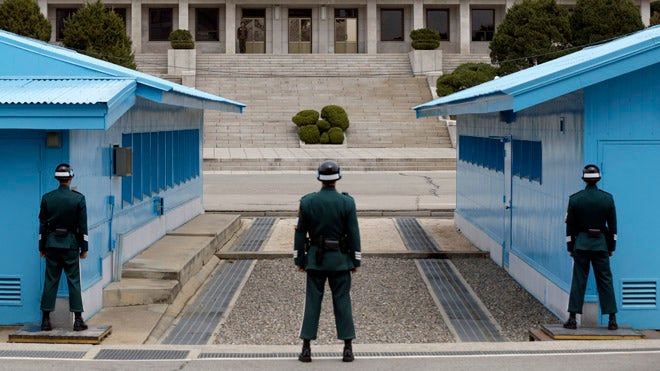
This past Thursday, North Korea once again made claims that they possessed “’powerful striking means’ on standby for a launch, while Seoul and Washington speculated that the country is preparing to test a medium-range missile during upcoming national celebrations.” This statement is the newest comment in a line of warlike threats made by North Korea to pressure Seoul and Washington into altering their North Korean policies.
Officials believe that Pyongyang appears to be in the process of preparing to test-fire a medium-range missile designed to reach Guam. If this test goes through, North Korea would be violating United Nations Security Council resolutions prohibiting them from nuclear and ballistic missile activity. North Korea has previously been punished for “launching a long-rang rocket in December and conducting underground nuclear test in February.”
Although analysts do not believe that North Korea will launch an attack on par to the one that began the Korean War, there are “concerns that animosity could spark a skirmish that could escalate into serious conflict.” United States Defense Secretary Hagel was quoted as saying “North Korea has been, with its bellicose rhetoric, with its actions…skating very close to a dangerous line…Their actions and their words have not helped defuse a combustible situation.”
“The missile that officials believe Pyongyang is readying has been dubbed the “Musudan” by foreign experts after the northeastern village where North Korea has a launch pad. The missile has a range of 3,500 kilometers (2,180 miles) and is designed to reach U.S. military installments in Guam and Japan, experts say.” In preparation for the anticipated launch, Seoul has deployed naval destroyers, a surveillance aircraft, and a land-based radar system, while Japan has deployed missile interceptors.
This war talk by North Korea has been viewed as a way to draw attention to the security situation along the Korean Peninsula, while also serving as an attempt to improve the military credentials of Kim Jong Un.
In recent weeks, the United States and South Korea have both held military drills to illustrate the military strength of the two. However, North Korea has condemned the drills “as rehearsal for an invasion.”
With that being said, please consider the following questions:
(1) What do you think should be done on the part of the international community to address the possibility of a launch?
(2) Should the United States and South Korea consider preemptively striking North Korea?
- a. Does the fact the Pentagon believes that “North Korea has advanced its nuclear knowledge to the point that it could arm a ballistic missile with a nuclear warhead” (although weapon is believe to be unreliable) change your opinion at all?
*Article Source: Fox News: New Round of War Rhetoric
The United States is obviously taking this situation seriously, but as I keep reading about more and more threats from North Korea, I wonder if I should be concerned. First of all, there’s nothing that I can do. Second, we are the United States, the most powerful nation in the world. I know that the Pentagon is capable of preventing any missile launch stemming from North Korea. Maybe I am just being optimistic, or maybe even patriotic, but I am not scared of North Korea. If we were being threatened by China, I think the situation would be more concerning. This is not to say that we should not address every threat that emerges from North Korea, but I do not feel that a nuclear war between the U.S. and North Korea is even a remote possibility. I hope I am right. Should North Korea ever try to make such a bold and idiotic move, it would most likely be their last.
Under the classical definition of “imminent threat”, it would be illegal for the United States to launch a pre-emptive strike against North Korea. The new definition of “imminent threat” in the context of allowing drone strikes against Al-Qaeda operatives and associate terrorist forces would allow a pre-emptive strike, but in North Korea’s case, the justification for this new definition is inapplicable because North Korea is a nation state. Therefore, the United States would not be allowed to strike first. With regard to whether they “should”, I do not believe so. It would be literally impossible for North Korea to invade the United States. They do not have a single aircraft carrier. They lack the logistical capability to land a significant number of troops in our borders. As Mr. Dowdle said, if all they wanted was to launch a few missiles at us, it would be the last thing they did.
The question I have is what if South Korea strikes first, claiming self defense, in violation of international law but under the justification of our new non state actor definition of “imminent threat”, claiming that it applies, do we still side with South Korea in the event of that war?